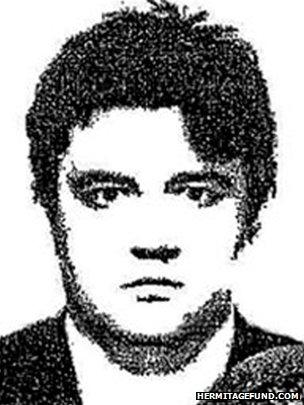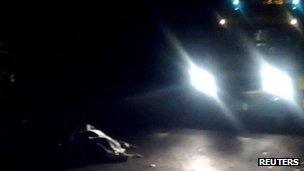What killed Alexander Perepilichny?
- Published

Alexander Perepilichny has been described as an intelligent, calm man who looked healthy
Three months after Russian businessman Alexander Perepilichny was found dead near his Surrey home, the question of how he died remains a mystery.
Surrey Police have confirmed to the BBC that scientists are conducting a wide range of tests, including attempts to find out if he was poisoned, after two earlier post-mortem examinations failed to find any obvious cause of death. They are still waiting for the results.
Mr Perepilichny, who was 44 years old, died suddenly last November near his luxury home on an exclusive private estate near Weybridge.
Grainy amateur video shows his body lying in a dark road shortly after it was discovered; a woman can be heard expressing her shock at how cold he felt.
For days afterwards it was assumed he had died of natural causes, most likely a heart attack, but then the police received information indicating they should carry out a full investigation.
'Transnational crime'
"We wrote a letter to the chief constable of Surrey to say he [Alexander Perepilichny] had been co-operating in a major case of transnational crime," says Bill Browder, head of the London-based investment firm Hermitage Capital, which used to have substantial interests in Russia.
"We said he was a healthy 44-year-old old man who suddenly dropped dead after handing over documents [to us]."
According to Mr Browder those documents led to a breakthrough in his investigation into what he claims was the biggest tax fraud in Russian history.
Mr Browder has accused Russian officials, police officers and a criminal gang of seizing control of three of his subsidiary companies in Moscow so they could carry out the alleged fraud, costing the Russian state $230 million (£155 million).
The alleged fraud was discovered by Sergei Magnitsky, a lawyer working for Hermitage, but he himself was arrested and later died in a Moscow prison.
His death has been condemned by many governments around the world.

A released image showed a covered body in Weybridge with a police car nearby
The British Foreign Secretary, William Hague, raised the issue with his Russian counterpart Sergei Lavrov during their meeting in London this week.
"To date there has been no meaningful progress towards establishing the circumstances surrounding his death," Mr Hague told the Russian news agency Interfax.
"I have urged my Russian counterpart to ensure that those responsible are brought to justice without further delay, and measures are put in place to prevent such cases from happening again."
There has also been no action taken against the main group of people accused of carrying out the fraud itself, which is why Mr Browder claims the documents provided by Alexander Perepilichny were so important in pushing forward his investigation.
He says the documents allegedly show how some of those he has accused of the fraud transferred around €7 million (£6.2m) to bank accounts in Switzerland and used part of the money to buy luxury properties.
"We [already] had all the evidence to probably indict and convict 60 people inside Russia," says Mr Browder.
"But the Russian police and Russian authorities covered up the entire system. So we were looking for evidence to do something outside of Russia.
"What Perepilichny provided us with was absolutely lock-tight documentary evidence which allowed for assets to be frozen and a major international money-laundering investigation to be launched by the Swiss police and the Swiss prosecutor."
The Swiss prosecutors' office has confirmed to the BBC that Mr Perepilichny provided evidence to them in person and that their investigation continues.
The BBC has also seen a document from a Moscow court hearing two years ago in which a spokesperson for Mr Perepilichny said he had left Russia to live in Britain in 2009 because he feared for his life.
The hearing was in connection with debts which Mr Perepilichny allegedly owed to a Russian company.
'Hit-list'
Here in Britain, he seems to have kept a very low profile - no-one we spoke to in the Russian community in the London area knew him.
But two people who did meet him, and who wished to remain anonymous, described him as an intelligent and calm man who looked healthy after going on a diet and taking much more exercise in the months before he died.
They said he had told them he faced problems back in Russia after losing a very substantial amount of his own and other people's money in the financial crash of 2008 when he had been a currency trader.
He also told them a Moscow police officer had warned that he was on a hit-list, but he was not sure if this was a genuine warning or an attempt to obtain money for protection.
And yet, despite all this, it remains entirely possible Mr Perepilichnyy did die of natural causes.
Senior pathologists have told the BBC that people in their 40s can suddenly drop dead from heart attacks and it can be difficult to find evidence of this during a post-mortem.
Which means everything now depends on the results of the toxicology tests.
For some in the Russian community in Britain, who like Alexander Perepilichny have also fled Russia because of fears for their safety, it is a worrying time.
Russian exiles say those among them who have been attacked or killed in Britain has been growing since the polonium poisoning of the former spy Alexander Litvinenko in London in 2006.
Another murder would be proof that exile in Britain provides no protection from enemies back home.
- Published13 March 2013
- Published28 November 2012
- Published7 March 2012
- Published9 April 2012